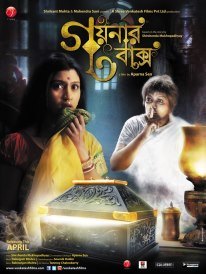Plot
The story is centred around the a wooden box containing 500 bharis of gold ornaments kept sequestered away. Its original owner is Rashmani, the daughter of a Bengali Hindu zamindar family from Faridpur, who was married off at the age of 11 & was tragically widowed within a few months of her marriage. She was extremely possessive of her jewellery & utilised her hot temper to keep others away from her jewellery box. Following the partition of Bengal, she migrated alongside her brothers' family to a suburb called Nababganj located near Ichapore in West Bengal. In 1949, Somalata, the daughter of a poor family, enters the household as the wife of Chandan, the younger of the 2 sons of Rashmani's younger brother. Due to not being greedy for jewellery, Rashmani develops a liking for her. However, a few months after Somalata's marriage, Rashmani dies. Due to excessive attachment towards her jewellery, Rashmani becomes a ghost in her afterlife. To keep her jewellery away from the hands of her greedy relatives, Rashmani's ghost hands them over to Somalata.
As time progresses, the family's accumulated wealth steadily decreases due to the male members of the family refusing to work for a living in order to protect their aristocratic heritage, exacerbated by the cost of legal fees incurred in resolving the property dispute between Rashmani's two brothers and the gambling addiction of Chandan's elder brother. In midst of all of these difficulties, Somalata was able to keep the jewellery box hidden away, under the ever-watchful eye of Rashmani's ghost. Finally, she secretly arranges for some money by pawning some of the hidden jewellery, and with that money she sets up a business of selling saris, despite opposition from her father-in-law and brother-in-law. Somalata effectively manages the shop (which she named after Rashmani in her honour) and was able to return the pawned jewellery. When Somalata came to know about the existence of Chandan's mistress, she complained about it to Rashmani's ghost, who then encouraged her to forge an extra-marital affair. Somalata slowly falls in love with a Bengali Muslim man named Rafiq who was a poet, but she later abandoned him out of conscience and consummated her marriage completely with Chandan, heartbroken Rafiq committed suicide. Failing to make Somalata unchaste, Rashmani stopped visiting her and started meeting with Somalata's daughter Chaitali.
Modernist & pursuing higher education in a college, Chaitali quickly befriends Rashmani's ghost. Since Chaitali shared a lot of facial features with Rashmani, Somalata believes that Rashmani had reincarnated as Chaitali, so she hands over Rashmani's jewellery box to her. The film now progresses to the year 1971 with the outbreak of the Bangladesh Liberation War. Rashmani's lover Banwarilal (alias Benu) repeatedly crossed the border to provide supplies to the Mukti Bahini. After he was caught and shot dead by the Pakistani army, Chaitali on being advised by Rashmani's ghost , donates all the jewellery in that box to the cause of the Mukti Bahini and later Chaitali also learns about Rafiq and Somalata's past from the last few scripts of poems written by Rafiq which she finds in an abandoned house where she used to meet with her lover "Benu".She hands those letters to Somalata anonymously making her realize the depth of love which Rafiq had for her in the past. In the end Somalata finally realized her feelings which she had in the past which causes Rashmani's soul to finally have peace and to be liberated from the state of being a ghost.
This page is based on this
Wikipedia article Text is available under the
CC BY-SA 4.0 license; additional terms may apply.
Images, videos and audio are available under their respective licenses.
